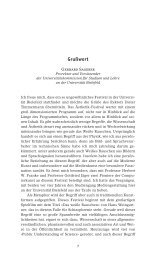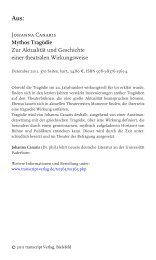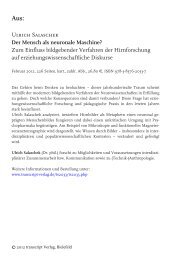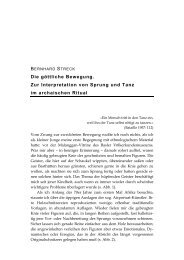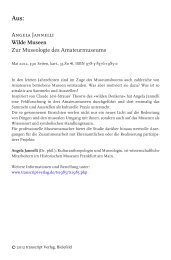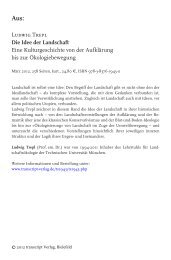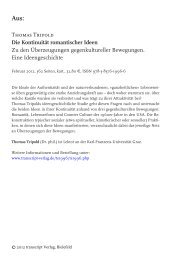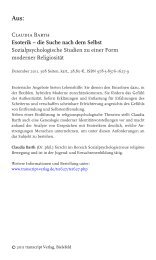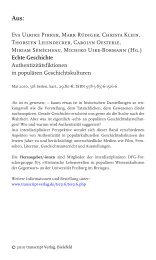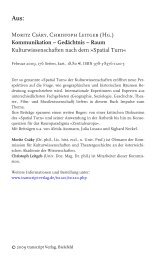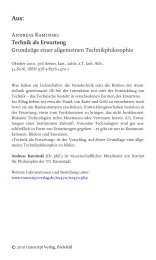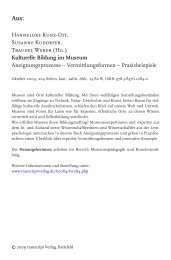Julia Straub (ed.) Paradoxes of Authenticity Studies on a Critical ...
Julia Straub (ed.) Paradoxes of Authenticity Studies on a Critical ...
Julia Straub (ed.) Paradoxes of Authenticity Studies on a Critical ...
Create successful ePaper yourself
Turn your PDF publications into a flip-book with our unique Google optimized e-Paper software.
INTRODUCTION | 11<br />
ing, the creator’s touch will vanish, which will “injure works <str<strong>on</strong>g>of</str<strong>on</strong>g> art<br />
and c<strong>on</strong>demn them to be fragmentary” (226). The artwork will look<br />
flawless, but its authenticity is nothing but an illusi<strong>on</strong>.<br />
There are, <str<strong>on</strong>g>of</str<strong>on</strong>g> course, different kinds <str<strong>on</strong>g>of</str<strong>on</strong>g> authenticity. Adorno’s authenticity<br />
bel<strong>on</strong>gs to the realm <str<strong>on</strong>g>of</str<strong>on</strong>g> aesthetic thought, and his writings<br />
have deeply influenc<str<strong>on</strong>g>ed</str<strong>on</strong>g> ensuing debates about the status <str<strong>on</strong>g>of</str<strong>on</strong>g> the artwork<br />
in a world where the c<strong>on</strong>diti<strong>on</strong>s for the producti<strong>on</strong> <str<strong>on</strong>g>of</str<strong>on</strong>g> art have chang<str<strong>on</strong>g>ed</str<strong>on</strong>g><br />
so much. Existentialist philosophers such as Søren Kierkegaard, Fri<str<strong>on</strong>g>ed</str<strong>on</strong>g>rich<br />
Nietzsche and Martin Heidegger had a completely different take<br />
<strong>on</strong> it, making authenticity a matter <str<strong>on</strong>g>of</str<strong>on</strong>g> life and death. Yet, however<br />
much <str<strong>on</strong>g>of</str<strong>on</strong>g> a truism this may be, the object world and the world <str<strong>on</strong>g>of</str<strong>on</strong>g> human<br />
interacti<strong>on</strong> are not separate. Miles Orvell, in his book The Real<br />
Thing, argu<str<strong>on</strong>g>ed</str<strong>on</strong>g> that the ne<str<strong>on</strong>g>ed</str<strong>on</strong>g> for authenticity is an unavoidable byproduct<br />
<str<strong>on</strong>g>of</str<strong>on</strong>g> civilisati<strong>on</strong> and came into force in the late nineteenth century<br />
with the <strong>on</strong>set <str<strong>on</strong>g>of</str<strong>on</strong>g> materialist culture and c<strong>on</strong>sumerism. <str<strong>on</strong>g>Authenticity</str<strong>on</strong>g><br />
begins to matter when the possibility <str<strong>on</strong>g>of</str<strong>on</strong>g> fraud arises, “when the society<br />
becomes so large that <strong>on</strong>e usually deals with strangers, not neighbors”<br />
(xvii). This facet <str<strong>on</strong>g>of</str<strong>on</strong>g> authenticity could be understood as a modern<br />
fight and flight mechanism, in resp<strong>on</strong>se to an evoluti<strong>on</strong>ary drive to<br />
build up trust and protect <strong>on</strong>eself from falsehood. Is authenticity still a<br />
productive, substantiat<str<strong>on</strong>g>ed</str<strong>on</strong>g> c<strong>on</strong>cept, or has it become obsolete and r<str<strong>on</strong>g>ed</str<strong>on</strong>g>undant<br />
– a mere husk <str<strong>on</strong>g>of</str<strong>on</strong>g> a word? 1<br />
The paradoxes <str<strong>on</strong>g>of</str<strong>on</strong>g> authenticity are exciting and inviting at best. At<br />
worst, they can be daunting and paralyzing. Hence, it is important that<br />
new ways <str<strong>on</strong>g>of</str<strong>on</strong>g> rec<strong>on</strong>ceptualizing authenticity as a productive c<strong>on</strong>cept<br />
are explor<str<strong>on</strong>g>ed</str<strong>on</strong>g>. Aleida Assmann, for example, speaks <str<strong>on</strong>g>of</str<strong>on</strong>g> authenticity as<br />
the signature <str<strong>on</strong>g>of</str<strong>on</strong>g> Western culture. Her c<strong>on</strong>tributi<strong>on</strong> to this volume<br />
shows that authenticity has play<str<strong>on</strong>g>ed</str<strong>on</strong>g> into earliest discourses <strong>on</strong> language,<br />
representati<strong>on</strong> and the self, going back as far as to Socrates and<br />
Plato, and Hamlet’s soul-searching. Other c<strong>on</strong>tributors discuss authenticity<br />
as something that is perform<str<strong>on</strong>g>ed</str<strong>on</strong>g> or ‘d<strong>on</strong>e,’ or even as a b<strong>on</strong>d be-<br />
1 This paradox is reflect<str<strong>on</strong>g>ed</str<strong>on</strong>g> in the title that Virginia Richter chose for her<br />
discussi<strong>on</strong> <str<strong>on</strong>g>of</str<strong>on</strong>g> “<str<strong>on</strong>g>Authenticity</str<strong>on</strong>g>: Why We Still Ne<str<strong>on</strong>g>ed</str<strong>on</strong>g> It Although It Doesn’t<br />
Exist,” from which she c<strong>on</strong>cludes that our “collective investment in it is so<br />
high that even after decades <str<strong>on</strong>g>of</str<strong>on</strong>g> dec<strong>on</strong>structivism and anti-essentialism it is<br />
impossible to get rid <str<strong>on</strong>g>of</str<strong>on</strong>g> it” (73).



